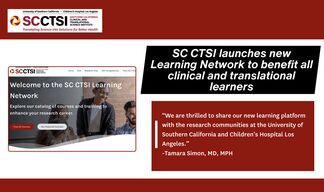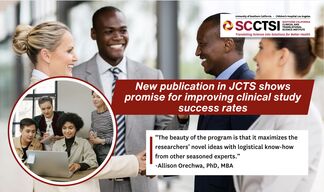Promoting Data Literacy Skills Among Students and Scholars in the Health Sciences
SC CTSI’s latest Digital Scholar workshops provide hands-on experience with social media data analysis and infographics.
In collaboration with the innovative healthcare social media analytics company Symplur, the Southern California Clinical and Translational Science Institute (SC CTSI) has launched a new workshop series to help students and scholars at USC develop marketable skills to analyze health-related social media data, develop actionable insights to inform organizational and research strategies, and communicate these messages through compelling infographics.
The most recent workshops, “Using Social Media Data to Gain Community Insights and Inform Organizational Strategy,” showed students how to tap into the immense quantity of data generated by the popular social media platform Twitter.
The broad introduction of digital and mobile technologies into nearly every aspect of society has presented health professionals and scientists with valuable opportunities. But a high degree of data literacy is required to extract useful insights from the billions of bytes of information generated every day, as well as to communicate those insights effectively.
Symplur provided the workshop students with access to Symplur Signals, a growing database of more than 850 million disease- and healthcare-related Twitter user messages (tweets). Updated daily, the database includes more than 320 million user profiles, 6,000 Twitter hashtags, and 14,000 unique healthcare topics.
“The collaboration with SC CTSI has been inspiring for all of us at Symplur working to advance research in this area. The data generated by social media activity has tremendous potential for researchers wanting to uncover insights on human behavior relating to health. Katja Reuter and her team are paving the way for academia to take advantage of and further this new research field.” said Symplur co-founder Audun Utengen.
Course attendees, who came from departments throughout USC, worked in groups of four to complete proposed analysis projects and develop reports.
"Although the workshop was extracurricular, we were delighted to work with a group of highly engaged students who impressed us with their thoughtful data reports and creative infographics," said Katja Reuter, PhD, Director of Digital Innovation and Communications at SC CTSI. “There is a clear need to train teams in academia, research, and health care to tap into this type of data and gain insights to inform their work in new ways, from science communication to patient engagement, study participant recruitment, and research projects in general.”

Students’ Perspectives
"I know there's a lot of data out there on social media and especially on Twitter, and after going to the workshop I learned that you could actually quantify a lot of the conversations. It's interesting being able to gather insight from many conversations and infer areas where you can make a difference," said Alison, Trinidad, Senior PR and Social Media Specialist, Keck School of Medicine of USC, and a student at the Annenberg School of Communications and Journalism whose infographic project placed first.
“I think it’s often difficult to tell a compelling story just by using numbers," she added. "The challenge is learning how to tell that story in way that people will engage with you. The workshop has helped me learn how to use infographics to simplify a data-dense message.”
Ning Huang, a PhD candidate in the Department of Biochemistry and Molecular Biology, whose infographic project placed second in the group evaluation, said that the workshop exposed her for the first time to the extent and value of social media data. She previously had no access to this data, nor did she know what type of questions it could help her ask and analyze. "The workshop taught me what we can learn from social media conversations for a preliminary analysis in support of a potential research project. This is novel and many research mentors don’t necessarily know how to do this,” she said.
"I took this course because it focused on social media and data literacy," added Benjamin Brekke, USC graduate student in Biostatistics and Epidemiology, and Health IT professional. "One of my focuses is public health policy, I really want these skills to improve my ability to communicate with the public."
Peer Evaluation Boosts Workshop Impact
Students were asked to evaluate each other's projects to determine the three best infographics. This process exposed them to the different ways their peers approached topics and solved problems. View the peer evaluation page
“The peer evaluation was one of the most exciting things about the workshop," said Huang. "It’s much more interactive than a homework project that you just get a score on.”
The workshop was part of the SC CTSI's ongoing Digital Scholar Training Series, designed to help researchers better use social media and other digital technologies to advance their research and career goals.
The workshop was supported by a Data-Driven Assignment Grant from the USC Center for Scholarly Technology in support of the Office of the Provost’s strategic focus on data literacy and by SC CTSI.
All workshop materials are available on the Digital Scholar page.



